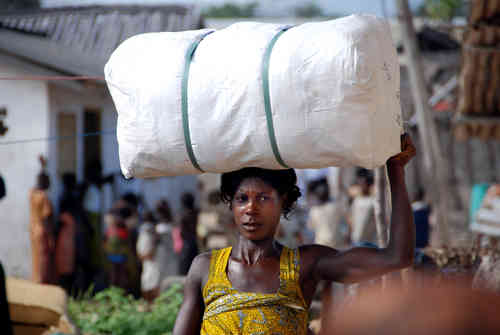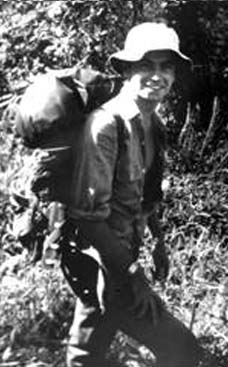
Darius Coulibaly experienced poverty and disease firsthand growing up in his native village in Ivory Coast. He eventually grew to 7 feet tall. His height and ambition led to basketball scholarships and degrees from U.S. schools. He founded his one-man charity Empowering the Poor in 2005 to put his philosophy into action. In 2006, he organized a conference of malaria experts in Nashville, Tenn., followed by events in Fredericksburg to raise money to build the first school ever in Tonhon, a poor village in northern Ivory Coast. Governments and large nongovernmental organizations (NGOs) use "top-down" approaches to help solve problems, he said. Coulibaly's approach is decidedly "bottom-up." He believes that no one from outside--no government, no NGO, no foreign experts, not even himself--can understand and change an African community as well as the people who live there. "The people with the problems are the ones who have the solutions. You can't sit in a glass office and make it happen," he said. "One difficulty of dealing with an indigenous community is reaching the people most at risk," he said. To that end, he met with leaders and health workers to make sure that pregnant women and children under 5 received and used the nets. "Many people think the nets are hot and claustrophobic. People sometimes use the nets one time and put them away in a suitcase like they were Sunday clothes," he said. "We need to prepare everybody and tell them, 'This saves you from dying. This saves you from taking medicine,'" he said.
Ghana RPCV Frank Delano writes: Local man's mission: Save lives in Prince's Town
Local man's mission: Save lives in Prince's Town
Caption: A villager carries malaria-fighting mosquito nets in Prince's Town. The World Health Organization estimates the disease kills 200,000 African infants each year.
Spotsylvania man leads effort to protect sister city from malaria
RELATED: Village clinic tackles heavy demand
Date published: 8/28/2007
BY FRANK DELANO
PRINCE'S TOWN, Ghana--Late one night in July, three exhausted travelers reached this remote village to deliver a life-saving cargo from Fredericksburg.
They had traveled hundreds of miles across West Africa in crowded buses, vans and, finally, a four-wheel-drive vehicle to bring three heavy bales containing 250 insecticidal bed nets to Prince's Town.
Darius Coulibaly, a 30-year-old special-education teacher at Chancellor High School in Spotsylvania County, led the team that included his physician sister and an assistant from their native Ivory Coast.
Coulibaly's mission began in April in Fredericksburg. He organized a Walk/Run Against Malaria that raised about $2,000 to buy and deliver the insecticide-treated nets that help prevent malaria.
But it was not "Mission Accomplished" for Coulibaly when he delivered the bed nets to Fredericksburg's sister city. It was "Mission Begun."
He talked the next morning with leaders of the town under an acacia tree, which he recognized as "a good herbal remedy for malaria."
He told them that the bed nets were just the start of a long-term effort to challenge and help the people of Prince's Town find their own solutions to their own problems.
Governments and large nongovernmental organizations (NGOs) use "top-down" approaches to help solve problems, he said. Coulibaly's approach is decidedly "bottom-up."
He believes that no one from outside--no government, no NGO, no foreign experts, not even himself--can understand and change an African community as well as the people who live there.
"The people with the problems are the ones who have the solutions. You can't sit in a glass office and make it happen," he said.
helping his homeland
Coulibaly experienced poverty and disease firsthand growing up in his native village in Ivory Coast. He eventually grew to 7 feet tall. His height and ambition led to basketball scholarships and degrees from U.S. schools.
He founded his one-man charity Empowering the Poor in 2005 to put his philosophy into action.
In 2006, he organized a conference of malaria experts in Nashville, Tenn., followed by events in Fredericksburg to raise money to build the first school ever in Tonhon, a poor village in northern Ivory Coast.
He added Prince's Town as his next project in Africa after the seaside village in Ghana and Fredericksburg became sister cities in December.
Mosquitoes, like those that abound in Prince's Town and the rest of sub-Saharan Africa, transmit the debilitating, often fatal disease. The nets help prevent its spread by protecting sleeping people from mosquito bites at night.
The World Health Organization estimates malaria kills 1 million people around the world each year, most of them in Africa.
Children are particularly susceptible to the high fevers and chills caused by the disease. According to WHO, 200,000 African infants die from malaria each year.
"Every 30 seconds, a child dies of malaria in Africa," Coulibaly said. The disease also puts pregnant women at risk of severe anemia, losing their babies or giving birth to low-weight infants.
Preventable and curable, malaria is a disease of the poor.
The bed nets Coulibaly donated to the town cost $7 each. Tablets of medicine to prevent malaria costs about $1 a day, more than most people in Prince's Town and Africa make.
Spreading the word
Coulibaly's five days in Prince's Town were filled with meetings to decide who would get the bed nets.
"One difficulty of dealing with an indigenous community is reaching the people most at risk," he said. To that end, he met with leaders and health workers to make sure that pregnant women and children under 5 received and used the nets.
"Many people think the nets are hot and claustrophobic. People sometimes use the nets one time and put them away in a suitcase like they were Sunday clothes," he said.
"We need to prepare everybody and tell them, 'This saves you from dying. This saves you from taking medicine,'" he said.
He also worked to set up committees that could continue the fight against malaria and help evaluate progress.
"Local leadership is the key," he said. "The head committee is always the chief and his council. But when we come to a community, we ask them to choose among themselves their leaders for committees on health or the environment."
Women must play a vital role in the effort, he said.
"We train women to become health agents, who, in turn, will educate the rest of the villagers by visiting them at their houses for one-on-one health sessions.
"Women are the ones who spend the majority of the day with the children. Therefore, it is vital that they possess basic hygiene and medical knowledge on the predominant diseases in their villages.
"It's very important for knowledge to stay within the poor communities because it empowers them. It reduces the prevalence of disease, which ultimately saves lives, and fosters leadership and peace. Less poverty means less war.
"The most important thing is you don't come in and impose something. In doing that, you disenfranchise the poor."
celebrating a gift
Late in the afternoon of July 10, hundreds of people turned out to greet him and his helpers at the raffia-walled grounds of the old Chief's Palace by the sea.
Splendid in their togas of bright African cloth, Chief Nana Kundumuah IV and his council of 14 family elders took their seats. Christian prayers were said. Libations were poured to honor the spirits of ancestors.
The town's awolebendo (ah-wo-lay-BEN-doh) group performed. The group's men pounded lengths of bamboo to create complex, tonal rhythms. The women, their dark shoulders decorated with white stripes of kaolin, circled in dance.
Coulibaly held a baby girl as he lectured the crowd on the causes of malaria and its prevention. The rapt crowd watched his helpers set up a mosquito net on sticks in the sand. A few eager children crawled in it.
"I would like to have one bed net," said a woman spectator in the crowd.
The sun had set when the chief presented Coulibaly and his sister Ernestine with sets of new African clothes. They went into a room to change into them.
The crowd cheered when they emerged in their new clothes. They cheered again when Coulibaly joined the circle of dancers. Cameras flashed. The children cheered each one.
It was a great occasion, Coulibaly said afterward.
"The people of Prince's Town changed it into a celebration. We see that across the continent. People appreciate the things they celebrate."
He said there was much work left for him to do in Prince's Town, but he had to return to his projects in Ivory Coast and, eventually, back home to Fredericksburg.
"Last summer, when I came to Africa, I went back to Fredericksburg with zero money. This year, I will go back with zero again," he said.
For more information on Coulibaly and his work, empoweringthepoor.org. Frank Delano: 804/333-3834
Email: fpdelano@gmail.com













